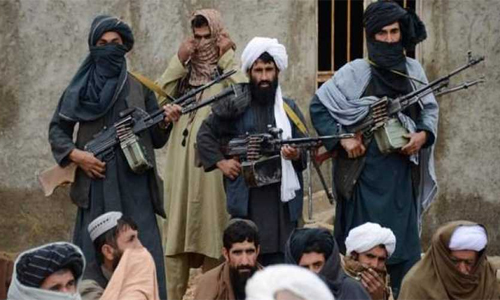As negotiations between the Taliban and the United States have picked up, India appears apprehensive about peace deal and had cautioned Washington not to take any hasty decision on this critical matter, which has huge bearing on peace and security of the South Asian region.
The United States has held several rounds of talks with Taliban representatives to reach an agreement so as to end the conflict in Afghanistan. The Indian government has opposed postponement of presidential election in Afghanistan and supports President Muhammad Ashraf Ghani administration, with which the Taliban are averse of holding direct negotiations.
India is of the opinion that no decision should be taken in haste to conclude agreement with the Taliban. The Taliban demand withdrawal of US and other foreign troops from Afghanistan before any deal is concluded. US Special Representative for Afghanistan Reconciliation Zalmay Khalilzad was in Delhi last month to discuss contours of peace agreement. He tried to ascertain views of India on any proposed peace agreement.
Khalilzad has arrived in Doha to hold the seventh round of talks with the Taliban and this round would be decisive as the two sides are expected to reach an understanding on withdrawal of US troops, but the Taliban have to give assurance to end terror sanctuaries.
The Trump administration has put two more conditions to the Taliban for making talks successful, which include ceasefire and direct talks with the Ashraf Ghani government.
The Taliban Spokesperson Suhail Shaheen said the US had agreed on complete troop withdrawal from Afghanistan and Washington would “never interfere” in Afghanistan affairs.
Nonetheless, US envoy made it clear that troop withdrawal would be part of the comprehensive agreement and would be implemented when other issues are tackled. Khalilzad reiterated that troop withdrawal would not be executed unless other demands are accepted. It would be part of a comprehensive peace agreement, which would include counter-terrorism assurances, intra-Afghan negotiations that would lead to a political settlement, and a comprehensive and permanent ceasefire.
Indian Representative to the United Nations Syed Akhbaruddin told the Security Council that the Taliban needed to act against terror sanctuaries and safe havens to ensure genuine and sustainable peace in the region. He said that terrorist activities of the Taliban, Haqqani Network, Islamic State (IS), as well as Al Qaeda and its proscribed affiliates, including the Lashkar-e-Taiba and Jaish-e-Mohammed, had to be ended. Syed Akhbaruddin said that shutting down terror sanctuaries must be a precondition for the peace deal to go forward. Intra-Afghan dialogue is also an essential element of the peace deal.
Regional stakeholders, including India, China, and Pakistan, have vowed to support intra-Afghan dialogue. Meeting with President Ghani on the sidelines of Shanghai Cooperation Organization summit, held in the Kyrgyz capital of Bishkek last week, Chinese President Xi Jinping and Indian Prime Minister Narendra Modi expressed support for the Afghan-led peace process.
It is believed that if the Taliban insist on the US troop pullout and hold out against negotiating with the Afghan government, the seventh round of talks will not yield a positive outcome, either. Subsequently, the two sides will seek to haggle over their demands and preconditions in the next round of talks.
Declaring his strategy for Afghanistan and South Asia in August 2017, US President Donald Trump pointed out a highly significant issue as he said that “the consequences of a rapid exit are both predictable and unacceptable” adding that “a hasty withdrawal would create a vacuum for terrorists, including ISIS and Al Qaeda.” Hence, taking a hasty decision on troop pullout will put the regional security at stake.
Clear picture about future of Afghanistan will emerge only after Doha talks as many critical and important issues are being discussed and finalized. The Taliban need to accept demand of entering into talks with the Afghan government which they have resisted so far. Since the US and Taliban representatives are unlikely to reach a peace deal without the presence of the Afghan government, regional stakeholders need to use their leverage to bring the Taliban to the negotiating table with the Kabul government.
Home » Opinion » No Hasty Deal with Taliban
No Hasty Deal with Taliban
| Sheikh Manzoor and Hujjatullah Zia

